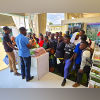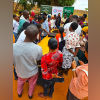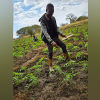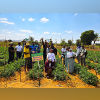What We Do
Mission
To empower grassroots communities, particularly women and youth smallholder farmers, by providing partipatory training that enables them to successfully navigate and thrive amid current political and socioeconomic reforms.
Read More
Vision
To establish an enabling environment that empowers Tanzania's grassroots farming communities,especially women and youth, to equally contribute to the nation's development,We achieve this by facilitating the effective utilization of agricultural opportunites and resources to significantly increase the income and improve the livelihoods of underserved populations.
Read More
Our Project Goal
To promote sustainable production, increase incomes and strengthen resilient farming systems within horticulture value chains for young men and women in the targeted regions of Tanzania
Read More
General Mandate
CDIS's overarching strategy involves promoting integrated Rural/Urban Development Programs encompassing education, health, agriculture, and income-generating activites to achieve sustainable improvements for marginalized communites.
Read More
CDIS:Organizational Experience and Impact
CDIS levrages over a decade of expertise in livelihoods improvement and economic strenghening, driven by a commitment to enchancing the socio-economic condition of vulnerable, marginalized, and deprived communities across Ranzania. our approach intgrates core program areas, including financial inclusion, youth empowerment, and sustainable agriculture,focusing primarily on women and youth.
1. Economic strengthening and financial inclusion (2017-2022)
CDIS levrages over a decade of expertise in livelihoods improvement and economic strenghening, driven by a commitment to enchancing the socio-economic condition of vulnerable, marginalized, and deprived communities across Ranzania. our approach intgrates core program areas, including financial inclusion, youth empowerment, and sustainable agriculture,focusing primarily on women and youth.
. Saving at the Frontier (SatF) Program: In partnership with Equity Bank and funded by the Mastercard Foundation via OXFORD POLICY MANAGEMENT (OPM). CDIS implemented this program from 2017 to 2022.
(i)Impact: Mobilized,formed , and trained 1,500 Household saving and credit Associations (HISA) groups (an updated VSLA model).
(ii)Digital Linkage:Digitally linked over 46,000 individual members to formal financial services via the dedicated ezzy kikundi platform and bank agency network across eight regions of Tanzania (Kilimanjaro , Arusha, Mwanza,Morogoro, Dodoma, Dar es salaam, Mbeya , and Songwe).
(iii)Integrated Support: Facilitated saving groups to establish and contribute to dedicated funds for supporting the education of most vulnerable children (MVCs).
2.Youth and women Empowerment programs (2020-2021)
CDIS actively engaged in developing the next generation of leaders and entrepreneurs, with a specific focus on young women.
. Advancing Youth Development Program: implemented a two-year youth development program (60% girls, 25% young mothers) funded by te Tanzania feed the future Advancing Youth Program via Development Alternative Inc.(DAI).
(i)Focus: Focused on leadership and community Engagement aiming to enhance youth employability,decision-making skills, and the establishment of business enterprises to combat youth unemployment
(ii)Outreach: Reached over 800 youth with diverse project intervention in th Mbeya region.
3.Comprehensive Livelihoods and caregiver support (2012-2016)
The organization has foundation experience managing integrated development projects for vulnerable population
. Most vulnerable children (MVC) and caregivers program:Implemented a five-year program in Mwanza region in collaboration with the Tanzania Home Economics (TAHEA) Organization,sub-granted by PACT Tanzania for over four years.
(i)Key Interventions: provided caregivers ( mostly women and youth ) with comprehensive training in entreneurship,saving methology (VSLA/HISA), and orange-fleshed sweet potato production for improved nutrition and income generation.
(ii)Results: Formed and trined 350 savings groups and directly reached over 1,600 smallholdr farmers (predomminantly women).
Community Development Initiatives support (CDIS)
Is currently implementing the ''strengthening Job Opportunities for youth in Horticulture Value chains' project in the morogoro and Dodoma Regions.
This 36-months initiative,running from August 2024 to 2027, is a core component of the wider ''Youth Enterpreneurship for the future of food and agriculture (YEFFA) program, The project is funded through a grant awarded by AGRA
CDIS,2025 All right reserved.





